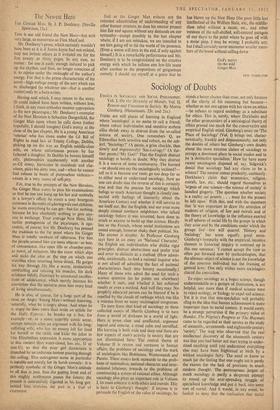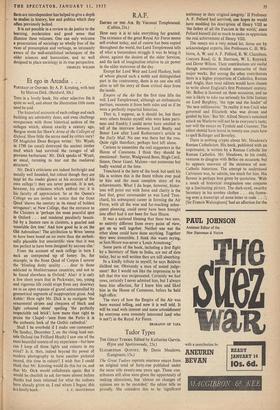Sociology of Doubts
ESSAYS IN SOCIOLOGY AND SOCIAL PHILOSOPHY.
Vol. I, On the Diversity of Morals; Vol. II, Reason and Unreason in Society. By Morris Ginsberg. (Heinemann, 25s. and 21s.) THERE. are still places of learning in England where 'sociologist' is no name to call a friend; where robust individualist and sensitive aesthete alike shrink away in distrust from the so-called science of society. One remembers Q, an Edwardian both sensitive and robust, on the sub- ject. 'Sociology?' (A pause, a grim chuckle, then slowly and expressively) `Soc-i-of-ogy!' (A fur- ther pause.) 'My God !' That the English distrust sociology is hardly in doubt. Why they distrust it is a source of some controversy. The learned —or should one say the sociologically inclined?— tell us it is because our roots go too deep for us to either need or understand sociology. Now no one can doubt that the reverse of this is certainly true and that the passion for sociology which befogs so much American thought is Closely con- nected with feelings of insecurity about the American Century and whether it will survive to see itself out. But the English, and our even more deeply rooted northern neighbours who talked sociology before it. was invented, have done as much as anyone to build up that science. Hardly less so the French, whose social institutions are sound enough, however shaky their political. No. The answer is simpler. As Professor Ginsberg says here in an essay on 'National Character,' the English are individualists who dislike rigid principles, distrust abstractions and prefer trial and error to dialectic as s method. (How admir- able, incidentally, to find a rational inquirer who is not afraid of admitting the fact of national characteristics back into history occasionally.) Many of those who admit the need for such a science question (as he points out elsewhere) whether it suits, and whether it has achieved results or even a method. And well they may. No prop-arty educated person can be blamed if he is repelled by the clouds of verbiage which rise like a miasma from so many sociological congresses.
To turn from that kind of sociology to these collected essays of Morris Ginsberg is to turn from a world of darkness to a world of light. Here. is prose clear and unaffected, argument logical and concise, a mind calm and unruffled. His learning is both wide and deep and there are few aspects of man's activity in society that are not illuminated here. The central theme of Volume' H is reason and unreason in human affairs, the problems of sociology and the work of sociologists like Hobhouse, Westermarck and Pareto. These essays look outwards to the prob- lems of nationalism,: national character, and inter- national, relations, inwards,- to the problems of constructing a system of rational ethics. Although sociology also plays an important role in Volume I, its main concern is with ethics and morals. This is basic to Ginsberg's thought : if anyone is to persuade the English of the value of sociology, he
stands a better chance than most, not only because of the clarity of his reasoning but because— whether or not one agrees with his views on ethics —he refuses to regard sociology as a substitute for ethics. This is, surely, where Durkheim and the other propounders of a sociological theory of ethics proved too much for the conservative and empirical English mind. Ginsberg's essay on 'The Place of Sociology' (Vol. I) brings out, charac- teristically, frankly and dispassionately, not only the doubts, of others but Ginsberg's 'own doubts about the more extreme claims of sociology to occupy a dominant place in social studies and to be 'a distinctive specialism.' How far have more recent sociologists disposed of, say, Sidgwick's denial that sociology had any claim to be a science? The answer comes prudently. cautiously. Durkheim's claim that economics, religion, morals, law, etc., should regard themselves as `organs of one science—the science of society' is handled gingerly. 'The question whether society is a reality stii generis . . . must for the present be left open.' With this, and with the statement that It was important to draw the attention of students of religion, of law and morals and of the theory of knowledge to the influence exerted in all spheres of social life by the groups in which they arise and by the conditions under which the groups live—few will quarrel. 'History and Sociology' has some equally good sense. Ginsberg's sympathy with the empirical, intuitive element in historical inquiry is summed up in this one sentence: 'I cannot accept the view so often put forward now by metbodologists, that the ultimate object of science is not the knowledge of the concrete individual but the framing, of general laws.' One only wishes more sociologists shared the conviction.
To reject sociology as a bogus science, though understandableas a gesture of frustration, is not helpful, any more than if medical science were to reject ecology, or biology to expel soil science. Yet it is true that non-specialists will probably . cling to the idea that human achievement is more important than its social context. It would surely be a strange perversion if the primary value of Hamlet, The Pilgrim's Progress or The Haywain came to be regarded as their service to the study of sixteenth-, seventeenth- and eighteenth-century 'society.' The wag who observed that the real intellectual discovery of the nineteenth century was that you had better not start trying to under- stand anything until you understood everything else may have been frightened at birth by a wicked sociologist fairy. The need to know so much (or the feeling that one ought to) is partly. the reason for the lack of precision in much modern , thought, The -porlinapteau jargon of much sociology is partly a desperate attempt to round up the ever-spreading straggle of specialised knowledge.and, put it back into some sort of corral. And it would, in any event, be foolish to deny that the realisation that social
facts are interdependent has helped to give a depth to studies in history, law and politics which they often 'previously lacked.
It is not possible in a review to do justice to the learning, moderation and good sense that illumine these volumes. One can only welcome a presentation of sociology so wholly free of the vices of presumption and verbiage, so intimately aware of the well-established techniques of the older sciences and humanities, and so well designed to place sociology in its true perspective.
CHARLES WILSON



































 Previous page
Previous page